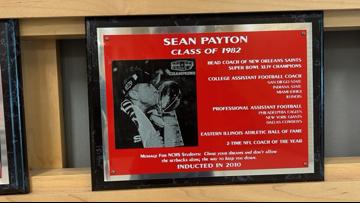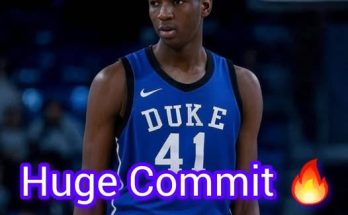Before Sean Payton hoisted the Lombardi Trophy as the head coach of the New Orleans Saints, before he orchestrated one of the most potent offenses in NFL history, before he became one of the most respected minds in professional football—he was a fiery, competitive teenager roaming the halls of Naperville Central High School in Illinois. It was there, amid the chilly Midwest autumns and Friday night lights, that Payton’s identity as a football mind began to crystallize. Much of his coaching DNA—his grit, intensity, attention to detail, and offensive ingenuity—can be traced back to his formative years in Naperville.
Born in San Mateo, California, Payton moved to Naperville at a young age and quickly became immersed in the area’s vibrant football culture. Naperville Central High School wasn’t just any ordinary suburban football program. It had a tradition of toughness, a standard of discipline, and a relentless pursuit of excellence that demanded every ounce of effort from its players. That environment shaped Payton not just as a quarterback, but as a thinker, a leader, and eventually, a visionary coach.
As a quarterback for the Redhawks in the early 1980s, Payton wasn’t the biggest, fastest, or strongest athlete on the field. But he had the one quality that defines most elite coaches: a burning desire to outthink and outwork everyone else. Coaches and teammates at Naperville Central remember him as fiercely competitive, cerebral in his approach, and never satisfied with “good enough.” Even then, he would spend hours studying film, scribbling plays in notebooks, and asking questions that many high school athletes wouldn’t even consider.
That mental edge distinguished him on the field. Though Payton’s playing career never reached NFL heights—he famously had a brief stint as a replacement player for the Chicago Bears during the 1987 strike—his high school days offered a glimpse into the coach he would become. He was always experimenting, always curious, and always aware that the mind could be the most dangerous weapon in football.
Naperville itself played a crucial role in this development. Located just west of Chicago, the town was a cauldron of tough, gritty football. It was the kind of place where players earned their respect in mud, cold, and sweat. It wasn’t a glamour program, but it was real football. The town’s work ethic seeped into Payton’s personality. There were no shortcuts. If you wanted to be good, you had to grind—and grind relentlessly.
Payton absorbed all of that. But more importantly, he began to develop a sense of leadership that would later serve him in NFL locker rooms filled with millionaires and egos. At Naperville Central, he wasn’t just the quarterback. He was the de facto offensive coordinator on the field. Coaches trusted his instincts. He knew where everyone on the field was supposed to be, and more than once, he was known to correct a receiver’s route or adjust blocking assignments in real time. That autonomy and command at such a young age gave him a foundational confidence that followed him throughout his coaching journey.
After high school, Payton went on to play at Eastern Illinois, another relatively unheralded program with a chip on its shoulder. But again, he thrived in an environment where toughness and intellect were equally valued. He set records there and earned All-American honors, but even more importantly, he started to see football through the eyes of a coach. His understanding of offensive schemes began to mature. By the time his playing career ended, Payton’s transition into coaching felt inevitable.
And when he did finally dive into coaching, starting at the collegiate level and working his way up through the NFL, he brought with him a distinct identity that bore all the hallmarks of his Naperville upbringing. He was meticulous, obsessive even, about preparation. He was fearless with play-calling. He wasn’t afraid to be unconventional. His offense in New Orleans—with Drew Brees at the helm—wasn’t just productive; it was innovative. Payton’s willingness to challenge the status quo, to outsmart defenses rather than simply overpower them, was rooted in those high school years where he learned to use his brain as much as his arm.
That same willingness to push boundaries became a hallmark of his coaching style. Payton’s teams were known for their creativity—onside kicks in the Super Bowl, aggressive fourth-down calls, and unorthodox formations. But none of it was reckless. It was calculated risk, shaped by decades of observation, experimentation, and instinct. And at the very core of that football philosophy was a teenage quarterback from Naperville who believed that thinking differently could give him the edge.
His leadership style, too, can be traced back to those early days. Payton has always demanded accountability from his players, but he also understands the value of trust and autonomy. Just like he was trusted to command the offense in high school, he instilled the same trust in his quarterbacks. His relationship with Drew Brees wasn’t just coach to player—it was a partnership. That dynamic, rare in the NFL, made the Saints’ offense one of the most efficient machines in modern football.
Even after his years in New Orleans, as he made the decision to return to coaching with the Denver Broncos, Payton brought that same hunger and humility. The Naperville kid never left. The same values that guided his first steps onto a high school football field still steer his approach to the game today. His legacy is not just built on wins and trophies, but on a mindset forged in early morning practices, gritty Midwest nights, and the relentless pursuit of excellence.
Ask Payton today about his coaching roots, and he’s quick to reference his past. He doesn’t speak in clichés. He speaks in specifics—about the coaches who challenged him, the teammates who motivated him, and the plays that failed or succeeded and taught him lasting lessons. That reflective quality, that awareness of where he came from, is part of what has made him such a compelling and effective leader.
In the world of professional football, where the spotlight often shifts to the brightest stars and flashiest plays, it’s easy to forget where greatness begins. For Sean Payton, it began in a place far removed from the glitz of the Superdome or the scrutiny of NFL media. It began in the film rooms and weight rooms of Naperville Central High School. It began with a young quarterback refusing to accept limitations, asking why instead of simply how, and always thinking one step ahead.
That’s the legacy of Naperville in Sean Payton’s coaching career—not just as the town he came from, but as the crucible in which his football soul was forged. Every play he calls, every risk he takes, and every game he prepares for carries echoes of those Friday nights in Illinois. And in the ever-evolving world of football, where change is constant and the margin for error is razor-thin, that unwavering foundation—built long ago in Naperville—may be the most powerful weapon Payton has ever had.



